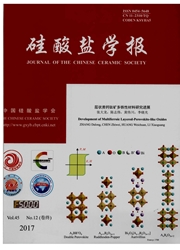

 中文摘要:
中文摘要:
研究了温度对水泥.矿渣复合胶凝材料硬化浆体微观结构及净浆和砂浆后期强度的影响。利用背散射图像分析法测定了硬化浆体中水泥和矿渣各自的反应程度。探讨了水泥.矿渣复合胶凝材料水化程度、微观结构和力学性能之间的关系。结果表明:温度对纯水泥的水化程度影响很小,但高温(60℃)降低了纯水泥净浆的后期抗压强度。高温阻碍了复合胶凝材料浆体中水泥的后期水化,但促进了矿渣的水化,提高了矿渣的后期反应程度。高温下矿渣持续反应使硬化浆体的孔结构细化,使复合胶凝材料净浆的后期抗压强度与常温养护时相近。高温对水泥.矿渣复合胶凝材料砂浆后期抗压强度的不利影响大于净浆后期抗压强度。高温养护并不导致水泥-矿渣复合胶凝材料的后期水化程度降低。复合胶凝材料的水化程度与强度不呈线性相关。
 英文摘要:
英文摘要:
The mechanism and consequences of temperature on the microstructure and the later-age strength of paste and mortar containing slag were investigated. The reaction degrees of cement and slag were determined via backscattered electron image analysis. The relationship among reaction degree of composite binder, microstructure and mechanical property was discussed. The results show that temperature has little effect on the final reaction degree of Portland cement, but elevated temperature results in a low compressive strength of Portland cement paste at later age. Elevated temperature (60 ℃) hinders the later-age hydration of cement in composite binder paste, but obviously promotes the reaction of slag and increases the later-age reaction degree of slag. The continuous reaction of slag makes the pore structure finer, thus leading to the compressive strength of paste similar as that cured under the standard condition. Elevated temperature has a greater detrimental effect on the later-age compressive strength of mortar rather than that of paste. Elevated temperature dose not decrease the later-age reaction degree of composite binder. The reaction degree of composite binder is not linearly correlated with the strength.
 同期刊论文项目
同期刊论文项目
 同项目期刊论文
同项目期刊论文
 Effectiveness of novel and traditional methods to incorporate industrial wastes in cementitious mate
Effectiveness of novel and traditional methods to incorporate industrial wastes in cementitious mate Measurement of chemical shrinkage of cement paste: Comparison study of ASTM C 1608 and an improved m
Measurement of chemical shrinkage of cement paste: Comparison study of ASTM C 1608 and an improved m Micro-structural development of gap-graded blended cement pastes containing a high amount of supplem
Micro-structural development of gap-graded blended cement pastes containing a high amount of supplem Characterization of reaction products and reaction process of MgO–SiO2–H2O system at room temperatur
Characterization of reaction products and reaction process of MgO–SiO2–H2O system at room temperatur Effect of carbonic acid water on the degradation of Portland cement paste: Corrosion process and kin
Effect of carbonic acid water on the degradation of Portland cement paste: Corrosion process and kin Characteristics of the hydration heat evolution of composite binder at different hydrating temperatu
Characteristics of the hydration heat evolution of composite binder at different hydrating temperatu Hydration heat evolution and kinetics of blended cement containing steel slag at different temperatu
Hydration heat evolution and kinetics of blended cement containing steel slag at different temperatu Volumetric deformation of gap-graded blended cement pastes with large amount of supplementary cement
Volumetric deformation of gap-graded blended cement pastes with large amount of supplementary cement Effects of curing temperature and fly ash on the expansion efficiency of shrinkage-compensating conc
Effects of curing temperature and fly ash on the expansion efficiency of shrinkage-compensating conc 期刊信息
期刊信息
